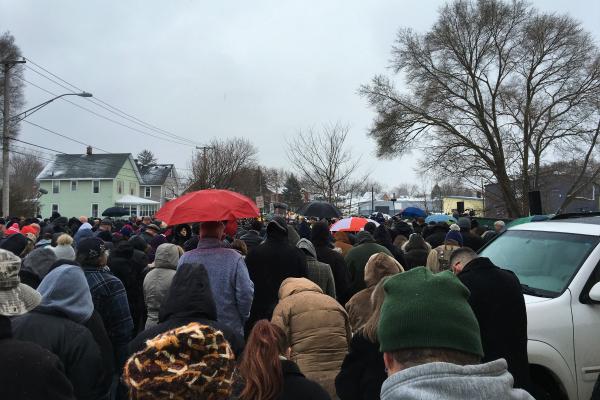Two days after a brutal workplace shooting in the Chicago suburb of Aurora, where five were killed and six were injured, over 1,000 people joined together for a prayer vigil at the Henry Pratt Company plant, filling the street near the building where the shooting occurred. As several local pastors shared prayers with the huge gathering of mourners, the only sounds that broke the silence between prayers were quiet sobs. Beside a gate connected to the plant, people placed flowers, candles, and signs.
As I quietly joined the prayers that local clergy were offering, I was reminded of what matters most to those suffering in the wake of mass trauma.
1. God draws near to the brokenhearted. When Rev. Dan Hass began the service, he echoed the words of the Psalmist, “The LORD is close to the brokenhearted and saves those who are crushed in spirit” (Psalm 34:18). He reminded those present of God’s steadfast faithful love that is poured out in a particular way on those who have endured suffering. In the wake of crises, people often struggle to make sense of God’s presence or absence in the midst of chaos. Scripture confirms that God is near.
2. Strength is found in community. The jarring impact of a disaster — both the ones we see coming and the kind we never dreamed of — is isolation. This is most obvious when a sufferer loses a loved one or spouse, as was the case in this senseless tragedy. But it is no less true when a community shares the same loss. Yet, when communities come together to name and grieve a shared loss, the whole community is strengthened. Even online communities can help individuals as they grieve. Joining with like minded people through causes such as Prayers & Action — and by signing the Prayers & Action petition — unites people from all walks of life with the mission of praying to end senseless acts of gun violence in America.
3. Lament is required. For people of faith, when tragedy strikes it can be tempting to rush past the confusion, pain, and loss in an attempt to assure ourselves and others that God has a plan. And while I believe in, and have personally experienced, God’s redemption in the midst of suffering, the reality is that for thorough and authentic healing, people need space to lament. It happened in Aurora, as a community lamented lives that had been cut short too early, grieving for the gifts of those lost that would never be shared with the world. It can happen in churches across the country on Sunday morning. The Bible bears witness to the importance of lament, for individuals and for communities, after disasters.
4. Violence requires a non-violent response. When life is lost so senselessly, it is natural to want to retaliate. Yet, several of the pastors reminded those in attendance that forgiveness is what is needed. When Jesus invited his followers to embrace a standard more radical than the prevailing law of “an eye for an eye,” he was recognizing our natural human temptation to respond to violence with violence. In a violence-plagued nation, we can see that violent responses to violence are futile. When the cruelest atrocities are met with moral integrity and spiritual faithfulness, there is hope for healing.
5. The identity of victims. It was once most common, in the wake of unforeseen tragedies like the Aurora shooting, for news outlets to produce the most coverage of the perpetrator of crimes, while the identity of the victims were often overshadowed. In the Aurora prayer vigil, every victim was identified and prayed for by name. By noticing and honoring them, the community agreed that the lives that had been lost mattered.
6. Physical acts of care. At least three vans offered coffee and hot chocolate to people attending the vigil, reminding me how important it is that people’s most basic physical needs are met during chaotic times of crisis. It matters to those who receive care, and it is also meaningful to those who are offering the care. Aurora resident Greg Zanis has made 26,275 crosses for victims of every national tragedy since the Columbine shooting in 1999. Although the five he made for victims in his own town were the most difficult, the physical act of creating and offering the crosses was an important act for Zanis and his own processing of the tragedy.
When communities continue to face heartbreaking and senseless tragedies across the country, we can feel helpless. And yet, we can learn from the brave communities who have faithfully and thoughtfully walked through their own disasters.
Got something to say about what you're reading? We value your feedback!







